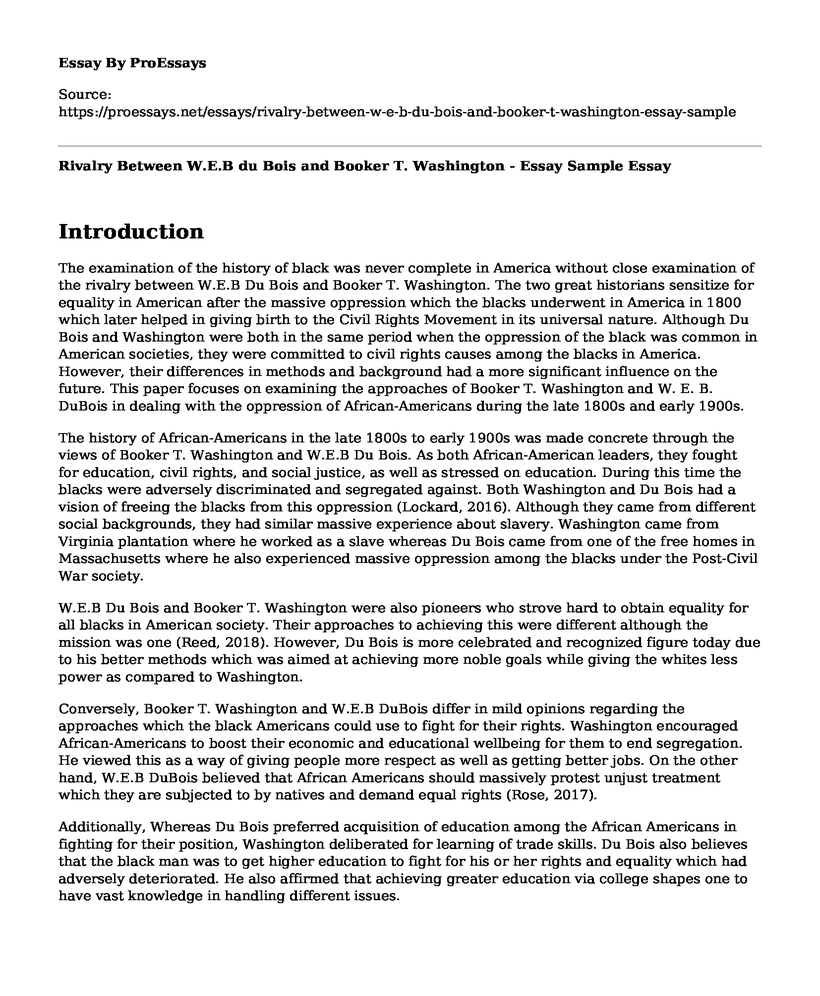Introduction
The examination of the history of black was never complete in America without close examination of the rivalry between W.E.B Du Bois and Booker T. Washington. The two great historians sensitize for equality in American after the massive oppression which the blacks underwent in America in 1800 which later helped in giving birth to the Civil Rights Movement in its universal nature. Although Du Bois and Washington were both in the same period when the oppression of the black was common in American societies, they were committed to civil rights causes among the blacks in America. However, their differences in methods and background had a more significant influence on the future. This paper focuses on examining the approaches of Booker T. Washington and W. E. B. DuBois in dealing with the oppression of African-Americans during the late 1800s and early 1900s.
The history of African-Americans in the late 1800s to early 1900s was made concrete through the views of Booker T. Washington and W.E.B Du Bois. As both African-American leaders, they fought for education, civil rights, and social justice, as well as stressed on education. During this time the blacks were adversely discriminated and segregated against. Both Washington and Du Bois had a vision of freeing the blacks from this oppression (Lockard, 2016). Although they came from different social backgrounds, they had similar massive experience about slavery. Washington came from Virginia plantation where he worked as a slave whereas Du Bois came from one of the free homes in Massachusetts where he also experienced massive oppression among the blacks under the Post-Civil War society.
W.E.B Du Bois and Booker T. Washington were also pioneers who strove hard to obtain equality for all blacks in American society. Their approaches to achieving this were different although the mission was one (Reed, 2018). However, Du Bois is more celebrated and recognized figure today due to his better methods which was aimed at achieving more noble goals while giving the whites less power as compared to Washington.
Conversely, Booker T. Washington and W.E.B DuBois differ in mild opinions regarding the approaches which the black Americans could use to fight for their rights. Washington encouraged African-Americans to boost their economic and educational wellbeing for them to end segregation. He viewed this as a way of giving people more respect as well as getting better jobs. On the other hand, W.E.B DuBois believed that African Americans should massively protest unjust treatment which they are subjected to by natives and demand equal rights (Rose, 2017).
Additionally, Whereas Du Bois preferred acquisition of education among the African Americans in fighting for their position, Washington deliberated for learning of trade skills. Du Bois also believes that the black man was to get higher education to fight for his or her rights and equality which had adversely deteriorated. He also affirmed that achieving greater education via college shapes one to have vast knowledge in handling different issues.
Conclusion
In conclusion, the formation of the NAACP by Africans through the support of Du Bois was purposed to fight for their civil rights and strength them from the outrageous oppressions which they were subjected to. However, when Du Bois left the organization, it was realized that the plight of the blacks was being addressed amicably through a well-organized manner which not only gave them the opportunity to air their grievances but also reduces the exposure to discrimination and segregation. Overall, due to exclusions and discriminations which were evident during this period, the problems of the African-Americans were handled differently at both the local, federal and state levels.
References
Lockard, J. (2016). WEB Du Bois in China-1959. American Studies Eurasian Perspective, 1(2), 99-109. https://s3.amazonaws.com/academia.edu.documents/45647802/duboisinchinafinal.pdf?AWSAccessKeyId=AKIAIWOWYYGZ2Y53UL3A&Expires=1552697458&Signature=%2BcYsxW3cy4UBwnV5PlJ3REr8fk4%3D&response-content-disposition=inline%3B%20filename%3DW.E.B._Du_Bois_in_China_-_1959__W..pdf
Reed, D. L. (2018). Web Du Bois: Writer, Scholar, Activist, Pan-Africanist, 1868-1963 David Leon Reed. WEB Du Bois and the Africana Rhetoric of Dealienation, 72.
Rose, W. A. (2017). " Your Majesty's Obedient Servant": A Case Study of WEB Du Bois and Pan Africanism within the Context of Ethiopianism, 1916-1954 (Doctoral dissertation, Morgan State University). http://hdl.handle.net/11603/10535
Cite this page
Rivalry Between W.E.B du Bois and Booker T. Washington - Essay Sample. (2022, Dec 05). Retrieved from https://proessays.net/essays/rivalry-between-w-e-b-du-bois-and-booker-t-washington-essay-sample
If you are the original author of this essay and no longer wish to have it published on the ProEssays website, please click below to request its removal:
- Do Violent Video Games Cause Aggression and Violent Behavior? - Essay Sample
- Paper Example on 'Acting White' Theory
- Essay Sample on Diverse Population and a Substance
- Depression: Poor, Ethnic Minorities Less Likely to Receive Treatment - Essay Sample
- Artist's Confession: A Story of Drug Abuse, Social Crimes, and Death - Essay Sample
- Essay Example on Nurses' Communication: An Essential Component of Nursing Practice
- Paper Example on OMB Directive 15: Promoting Integration Through Research on Racial Segregation







